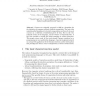Free Online Productivity Tools
i2Speak
i2Symbol
i2OCR
iTex2Img
iWeb2Print
iWeb2Shot
i2Type
iPdf2Split
iPdf2Merge
i2Bopomofo
i2Arabic
i2Style
i2Image
i2PDF
iLatex2Rtf
Sci2ools
115
Voted
HLPPP
1991
1991
The Chemical Reaction Model
Gamma was originally proposed in 1986 as a formalism for the de nition of programs without arti cial sequentiality. The basic idea underlying the formalism is to describe computation as a form of chemical reaction on a collection of individual pieces of data. Due to the very minimal nature of the language, and its absence of sequential bias, it has been possible to exploit this initial paradigm in various directions. This paper reviews most of the work around Gamma considered as a programming or as a speci cation language. A special emphasis is placed on unexpected applications of the chemical reaction model, showing that this paradigm has been a source of inspiration in various research areas. 1 The basic chemical reaction model The notion of sequential computation has played a central r^ole in the design of most programming languages in the past. This state of a airs was justi ed by at least two reasons: { Sequential models of execution provide a good form of abstraction of algorithm...
Arti Cial Sequentiality | Chemical Reaction Model | Distributed And Parallel Computing | HLPPP 1991 | Sequential |
| Added | 27 Aug 2010 |
| Updated | 27 Aug 2010 |
| Type | Conference |
| Year | 1991 |
| Where | HLPPP |
| Authors | Daniel Le Métayer |
Comments (0)

